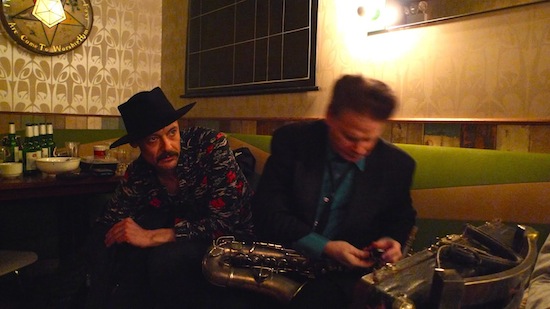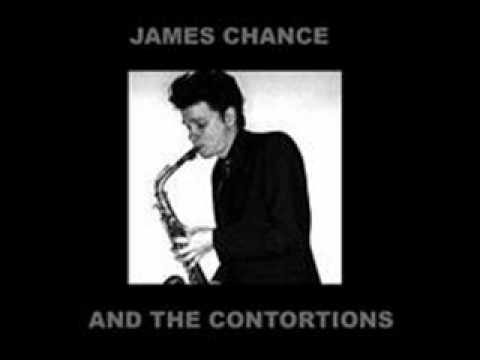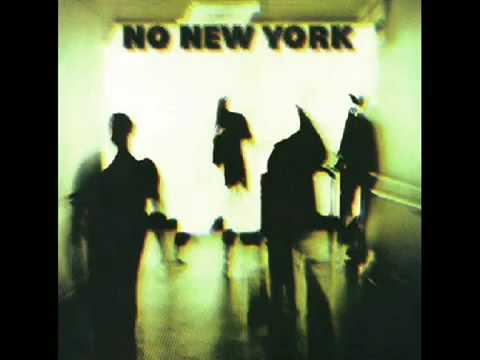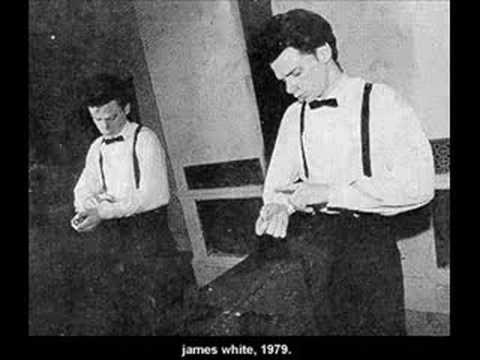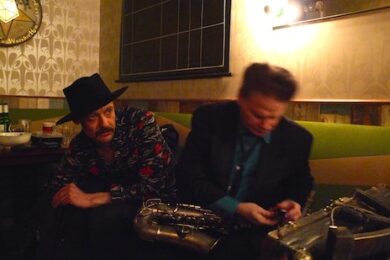Jazz/world music fusion behemoths Melt Yourself Down and New York no wave legend James Chance are to play their second ever gig together next week at the Village Underground on November 5, as part of Illuminations, a specially curated series of music, art and film events taking place in London. In anticipation of the collaboration, Melt Yourself Down’s Pete Wareham (also known for his pivotal roles in Acoustic Ladyland and Polar Bear) interviewed James Chance over the phone in New York. Prior to the interview, I asked Wareham to elaborate on his relationship with James and his music. He had this to say:
"I’ve been a fan of James for a while and as a saxophone player he helped liberate me from the usual jazz scenario and his music united the worlds of jazz and punk in a way which really resonated and immediately influenced my work with my previous band Acoustic Ladyland. In 2006 James played on an Acoustic Ladyland single which was then mixed by Paul Epworth and remixed by Scott Walker, called ‘Saltwater’. We didn’t meet, he sent me the files over from New York. I met him a couple of years later when he came to Brighton with Les Contortions.
"I named Melt Yourself Down after one of his obscure albums and he was on our mailing list so he got in touch when we announced the band to say that he liked it and if we were ever in New York to look him up for a guest spot or DJ support gig or something. Which is exactly what we did when we played in New York in March this year – he did a DJ set and played saxophone along with the records and then sat in with us afterwards. Which is when we had the idea to do a show together in London. Melt Yourself Down started out as a hybrid of Nubian rhythms and ESG/no wave-type dance music but is now slowly morphing into something else. We’re going to be his backing band for the first set and then he’s going to sit in with us for our set afterwards."
Thanks to Pete for conducting the interview.
Pete Wareham: So, I wanted to ask you, I’ve done a little bit of looking on the internet and you’ve been interviewed quite a lot about the history and the scene and everything. So I was thinking I might ask you more about the actual music.
James Chance: That’s fine, that’s more interesting to me, ’cause I get tired of being asked the same questions. What was it like in the East Village, and was it really so wild? And all that kinda shit…
PW: I wanted to ask you about the process, about how you write. I’ve particularly been liking something like ‘Designed To Kill’, which I’ve transcribed…
JC: Well if it’s a song that I’m gonna be singing as opposed to an instrumental, the first thing I do is I write the lyrics. I usually have the lyrics completely, or almost completely done before I start writing the music… well, the first thing is the concept of the song. As far as the lyrics go and what kind of tempo it’s going to be, what style it’s going to be in. If we’re talking about the funk stuff, I usually have the lyrics mostly written… but with the funk stuff, I don’t really sit down and write a melody. I have the lyrics done and then for the music, I usually start with the bassline…
PW: OK, well I’ve transcribed quite a few of these basslines and they’re great. Especially ‘Designed to Kill’… I mean, that’s quite a mad bassline…
JC: Yeah, I mean, the funk stuff all revolves around the bassline. That’s what I write first, and I usually make the bassline more of a melody in and of itself than most people’s basslines. And the next thing I would do would probably be the guitar part, which would be a different melody that kind of interlocks with the bass and fills in the spaces…
PW: I was gonna say about the guitar parts… well, Kushal (Gaya, Melt Yourself Down vocalist/guitarist) has been learning them and when he plays them to me on their own, it’s like, "Wow, they’re crazy" – the harmonies are really out there…
JC: You see, that’s another thing… I don’t write a chord progression. I mean, the songs are in a key – usually in a minor key but they’re not following a chord progression, it’s just two melodies that fit together and I’m not really thinking of them fitting into any predetermined chords. The guitarist, I just give him the melody and he’s free, if he wants to fit some chords under that, that’s up to him. Then after all that’s written… I never write the drum parts, if you’ve got a good drummer, he does it himself. And if you don’t have a good drummer, and you write him the part, its not going to make any difference [laughs].
PW: So when you’re writing it, how do you actually get it down? Do you write the bass on the keyboard?
JC: Yeah, I write on the keyboard. The keyboard’s my first instrument. I started playing piano when I was about seven, taking lessons from these nuns at the Catholic school I went to. Just playing, not even real classical music, just piano lesson books for children. I remember one piece I liked that I played was… did you ever watch the old Alfred Hitchcock TV show? This piece called ‘Funeral March Of A Marionette’… a real macabre-sounding melody. That was my favourite piece to play.
PW: I’m looking at ‘Designed To Kill’ at the moment and I’m looking at my part that I’ve written out, at the intervals and stuff – it looks like you’ve kind of chosen a specific scale to write from. Do you do that?
JC: I don’t necessarily start out thinking I’m going to use this key or this scale but if it just works out that way, that’s the way I hear it.
PW: I just transcribed ‘Jaded’ and was trying to work out the scale of the bassline…
JC: Well with ‘Jaded’, the song really is just the bassline and the melody and everyone else just gets to do what they want…
PW: The way the harmony kind of feels, it’s quite unsettling, which is why I think you can get so much mileage out of just that one bassline because it doesn’t ever feel repetitive.
JC: That was really the first song I wrote for the Contortions. In fact, it was even before the Contortions, I used to perform that song with Teenage Jesus [And The Jerks].
PW: I was just looking at ‘Contort Yourself’. The version you said you very specifically wanted to do. That’s got a 2/4 bar in it, like the beat turns round halfway through when it goes to the chorus. As far as I can see, that’s the only song that actually does that and I was wondering why?
JC: Well actually that’s got a kind of funny history, because the original version is on Buy, the Contortions album, but then when we did the James White And The Blacks album [1979’s Off White], that was supposed to be a disco album in some form, so we gave it this kind of disco beat but the first version that we recorded, when I went to an actual disco and had them play it, I realised that it was way faster than the normal disco tempo. So what happened finally was, they brought in August Darnell – Kid Creole – because he was also on the same label, to do a remix of it, and what he did was just slowed the whole track down mechanically, and then he took the guitar part out completely and he wrote a new one.
PW: Is it the August Darnell version you want to do, or is it the other version?
JC: Actually the version I normally do with my other bands now is kind of a combination of the two, but there’s no record of that, so I thought it would be easier for you guys just to learn that one.
PW: I wondered if you could talk about the sort of themes that you have in your lyrics. I’ve got ‘Contort Yourself’ and also ‘Throw Me Away’ here.
JC: Well, that’s kind of different, the stuff by The Contortions or on No New York, the lyrics on those were a bit more emotional… these days, they’re just as personal but they’re writing from a more objective point of view. I think my lyrics are kind of underrated …
PW: I think so too…
JC: I really work hard on them, and 90% of people who are writing now, they either write total cliches or they write stuff that’s totally obscure. And in my stuff I really try to say something specific and not just try to mystify people with a load of hogwash…
PW: There seems to be quite a lot in the words that I’ve found about a general theme to do with the body, the physicality of existence…
JC: Yeah, that’s true. I’m comfortable with that whole concept.
PW: Yeah, like ‘Melt Yourself Down’.
JC: That was written right after the Three Mile Island nuclear accident… that’s what inspired that song.
PW: Ah, OK… I’m looking at ‘Throw Me Away’ here: "Let me inject you around your throat, inside your eyes…"
JC: Yeah, well that was a little bit of a take on ‘I Can’t Stand Myself’ by James Brown, taking that further… Someone else asked me about that recently. I think what James Brown kinda means by that is that he’s so horny, he can’t stand himself? But with me, it’s more like I just can’t stand myself – nothing to do with sex! So, I like, when I do covers of other people’s songs, to have some sort of other take on the lyrics than what they literally mean.
PW: With ‘Contort Yourself’, I was looking at the lyrics for that and one thing I like about it – I don’t know if this is how you feel about it – but how you get these songs that are encouraging you to dance a lot and I felt as if ‘Contort Yourself’ is a bit like that but kind of times a million.
JC: Yeah, that’s where I was coming from… but trying to kind of twist it around, take it a couple of steps further.
PW: I love the lines: "Hey baby don’t you stick together/ And one of you just fall apart/ You better try being stupid instead of smart/ And once you take out all the garbage/ That’s in your brain, forget about your future/ It’s just too tame." It’s brilliant… almost invasive.
JC: I was just trying to put in some ideas, instead of just, "Let’s dance and have a good time". You’ve gotta take it to a deeper level than that.
PW: I was reading all the famous stuff about the audience confrontation and the things that you used to do. I read an interview where you said you did it for a bit and it kind of started getting a bit heavy, so you stopped…
JC: Yeah, and it also got to be something that people were just expecting… and for the wrong reasons…
PW: I just thought it was interesting that it felt like this was a direction extension of your lyrics though.
JC: Oh yeah, it was. The first time I did it, it wasn’t planned or anything. It was because I was playing a gig in this sort of rented hall that didn’t have a stage, so we were on the same level as the audience and all these people were sat down on the floor, and that just infuriated me. I just couldn’t tolerate that because it was like what hippies did and we hated hippies so much…
PW: The other question I wanted to ask you as well is, you’ve talked a lot about other music that you like, you’ve talked a lot about James Brown and [Thelonius] Monk, and I can hear a lot of Monk in your writing…
JC: It’s a combination, because as far as the interlocking rhythms, that really is directly from James Brown, because he was the first one to do that. I mean, I love Stax and Motown but that’s a much more conventional way of writing and simpler rhythms. James Brown was the first one to free the rhythms like that, where he had different instruments playing different rhythmic parts… When I was at the conservatory [the Wisconsin Conservatory of Music], I had to do a presentation to the class one time and I actually found some of these African folk recordings that were really close to certain James Brown records as far as the rhythms they were doing.
PW: That doesn’t surprise me. In the writing for my band I started out listening to a lot of Nubian rhythms. All the songs I write are based on Nubian rhythms… and one of the things I’ve been trying to say with my band is that a lot of these rhythms that are thousands of years old are still rhythms that we dance to now, because they fundamentally work for us as human beings.
JC: Yeah, that’s really true… and I also took some free jazz records, like one by the Art Ensemble [Of Chicago], and I think one by Sunny Murray, and I found some African folk records that were really close to what they were doing, some of the sounds they were getting.
PW: Apart from those influences, I was wondering what else you were listening to at the time. Specifically, I was wondering whether you listened to any of the electric Miles Davis stuff?
JC: Yeah, I did. I wasn’t so into Bitches Brew… well I liked it but it wasn’t really the funk… there was a double album he did around that time, Get Up With It, that one I was really into.
PW: Yeah, it struck me around the 70s, that there were a lot of attempts to kind of fuse rock and jazz…
JC: A lot of it, I felt – except for Miles’s stuff – a lot of it to me, it was interesting music but it somehow was too much somewhere in the middle and, to me, was kind of uncomfortable… like some of Ornette’s stuff strikes me that way. I feel that if you’re going to have an electric rhythm section that it should be rhythm… if you’re going to do something funky, make it real. But a lot of those guys were trying to take a funk rhythm and kind of abstract them somehow. One guy that did do some stuff, was Archie Shepp… he did this song ‘Mama Too Tight’, that was a real rhythm and blues, James Brown sort of thing. And he had that album Attica Blues – I used to really like that album. Another one is called The Magic Of Ju-Ju… there’s a song on that called ‘Sorry ‘Bout That’. It starts out pretty funky but it’s really long, they really stretch out on it.
PW: We talked about the jazz influence and everything but I was wondering what people you liked from the punk side of things as well.
JC: Well, as far as white rock & roll, what I really like is stuff from the 60s… but as far as the bands who were my contemporaries, my favourites were Suicide… and I liked Richard Hell’s stuff, Bob Quine was a great guitarist. And I liked The Cramps… but the stuff I really liked were the English rhythmic blues-influenced bands like The Animals, The Yardbirds, I really loved The Spencer Davis Group and then American bands like The Young Rascals, Mitch Ryder… and then I liked some of the real garage sort of stuff like ? And The Mysterians, The Standells. A lot of that was an important influence, not so much musically but as far as like, the attitude, and also an influence on my singing in the early days. I’m actually a much better singer than I was in those early days. Some of the live recordings I’ve heard of the really early stuff makes me cringe, because the vocals were just so much screaming over the top…
I like the energy on them though…
JC: Yeah, the energy was great, but, after a while there’s kind of a fundamental misunderstanding of the role of a scream, because it has to be in the right place at the right time. If you just do it constantly, it gets boring and loses its meaning. A lot of the R&B singers now, not so much with screaming but they do what they call melisma, that singing one word with all kinds of different notes… they overdo that so blatantly, it’s terrible. If you listen to Aretha Franklin or someone like that, they do that but they do it tastefully and in the right place, they don’t do it on every single syllable…
PW: I completely agree with you, yeah. So, do you still listen to music from today?
JC: I listen to very little music from today. You guys are one of the few bands from today that I really like… I very rarely buy a record that was made after 1980. I’m really into he Afrobeat from the 70s, rare funk stuff from the 60s and 70s and also all the early R&B from the 40s and 50s and early 60s… Singers like Dinah Washington.
PW: I read somewhere in an interview that you gave up music for a while and I was wondering if there was a period where there wasn’t much going on…
JC: It wasn’t that long, it was only a few years that I stopped playing. It was the early 90s. There just was nothing happening, no opportunities for me. The original scene that I was part of in the 80s, was kind of dwindling… and all the stuff that was going on in music then, like grunge, I just didn’t relate to it. I mean, I liked a couple of songs by Nirvana but the whole movement of that was something that was really alien to my style and approach. It was too soon for there to be this kind of revival of no wave. What happened to get me out of it was in ’95, Henry Rollins started a label to reissue a lot of the 80s stuff, like Gang Of Four and my records, the ones I did for ZE Records… It was kind of a flop because it was too soon, but it was enough to get me interested again and enough for me to start a new version of the Contortions and start working again. The full resurgence of interest really started around 2000 or so, until 2008 when everything collapsed… and now, there’s interest but it isn’t at the level that it was. I’ve been mostly working in Europe with my French band, but the last couple of years, the economy hasn’t been good. They’re paying less money… and I had a tour cancelled last spring because it wasn’t viable economically. Actually I’ve been looking into going to Australia. Right about the time you guys played in New York, this Australian band also contacted me… and one of the guys from that band is trying to set up a tour for me over there.
James Chance and Melt Yourself Down play the Village Underground in London this Wednesday, November 5, as part of Illuminations; for full details and tickets, head here. We’ve got a pair of tickets to give away to the gig – to be in with a chance of winning, just e-mail comps@thequietus.com, with ‘CHANCE’ in the subject line. The competition closes at 5 pm on Tuesday 4 November, after which we’ll pick a winner at random. To read the Quietus Competition Terms & Conditions, click here

